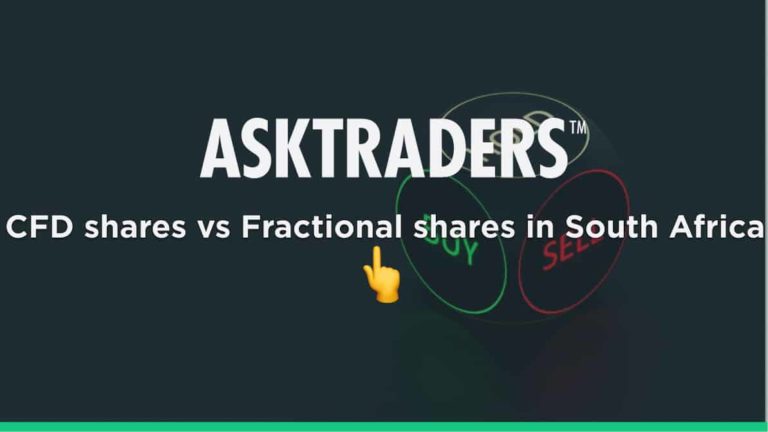
Understanding CFDs
Contract for differences (CFD) refers to a financial derivative in which the difference between the opening and closing prices of a deal is settled in cash. When utilizing CFDs, you cannot rely on receiving a specific stock or product.
Contracts for Differences are a useful mechanism for South African traders.
CFDs can be used to speculate on the fluctuation of the prices of assets and derivatives. Derivatives are essentially financial investments whose source is an underlying asset. Consequently, traders and investors in South Africa utilize CFDs to wager on the price movement of the underlying asset or security.
Contracts for Difference (CFD) traders can wager on either a price increase or decline. CFDs are traded similarly to stocks, with buyers anticipating a price gain and sellers anticipating a price decrease.
A buyer of a CFD may elect to sell if the value of the underlying asset increases after they purchase it; however, they must first calculate the difference between the buy and sell prices. The finalized profit or loss from trading is reflected in the investor's brokerage account.
One opens a sell position when they anticipate that the value of a security will drop. In order to close the position, they must acquire an offsetting transaction. The gain or loss is once again netted and deposited into their account.
How to trade CFDs in South Africa

Contracts for Differences (CFDs) can be used to trade a variety of assets and securities, including exchange-traded funds (ETFs). In order to forecast price fluctuations, South African traders will also utilize commodity futures contracts, such as those for corn and crude oil.
Futures contracts are standardized agreements that bind parties to purchase or sell a specified item at a specific price and date in the future.
CFDs, as opposed to being actual futures contracts, enable investors to speculate on the price changes of futures. CFDs are exchanged in the same manner as traditional securities, with buy and sell prices and no expiration date.
A group of brokers in South Africa manage the over-the-counter (OTC) market for contracts for difference by balancing supply and demand. Alternatively, important exchanges such as the Johannesburg Stock Exchange prohibit the trade of CFDs.
Consequently, with a CFD, the difference between a trade's opening and closing prices is exchanged between client and broker.
Understanding Fractional Shares
A fractional share is a holding in equity that is worth less than a whole share. These shares may result through a stock split, a dividend reinvestment plan, or any other commercial activity.
Although fractional shares would be favourable for investors, the restricted liquidity of the stock market makes them impractical.
Numerous events, including stock splits, mergers, and acquisitions, can result in the creation of fractional shares.
Dividend reinvestments
In South Africa, participants in dividend reinvestment plans (DRIP) may end up with a mix of whole and fractional shares. Through dividend reinvestment arrangements, South African shareholders can reinvest their dividends in additional shares of the same company or fund.
Due to the cyclical nature of the money's reinvestment in the acquisition of additional stock, this is not restricted to whole shares. Reinvesting capital gain distributions or engaging in dollar-cost averaging can also result in the purchase of a fractional share.

Mergers and acquisitions
A corporation may issue fractional shares in the event of a merger or acquisition due to the widespread practice of combining new common stock at a fixed ratio. Shareholders may only receive a small amount of a share due to the ratio.
Certain brokerages may split whole shares in order to sell smaller quantities of stock to consumers. This type of share split is usual for large stocks such as Tesla or Google.
Stock splits
Occasionally, the number of shares remaining after a stock split may be divisible by 2. After a 3-for-2 stock split, shareholders with an odd number of shares would end up with a fraction of a share since they would receive three shares for each pair of shares they already own.
How to trade fractional shares in South Africa
In South Africa, fractional shares can only be combined with other fractional shares to make a whole share for sale through a major brokerage. If market demand for the stock being sold is low, it may take longer than anticipated to sell the fractional shares.
Some South African investors who obtained fractional shares inadvertently due to stock splits may not be interested in preserving them.
If the stock is in high demand, they may find a brokerage firm ready to accept the fractional share. In addition, they may look for a South African brokerage firm that is willing to sell another half share.

Advantages of trading CFDs in South Africa
With the use of contracts for difference (CFDs), South African investors can track the price movements of the underlying security's market without actually purchasing or receiving the underlying asset.
CFD trading on margin is enabled by the ability to borrow funds from one's broker in order to increase one's leverage or position size in order to magnify gains. Before approving this form of trade, brokers in South Africa will need traders to have a minimum balance in their accounts.
The leverage offered by CFDs is often greater than that offered by more conventional trading approaches.
In contrast to traditional exchanges, the CFD market typically has less restrictions. Consequently, you may need less capital to open a CFDs brokerage account.
$ 100 is the normal minimum deposit required to open an account with a South African broker. Cash dividends distributed on CFDs, which are securities that mirror the acts of actual companies, can also boost a trader's return on investment.
The majority of CFD brokers offer their products on all major markets. Traders may utilize their broker's interface to access all open markets.
Lastly, a trader in South Africa utilizing CFDs can swiftly and easily open long or short positions, as well as purchase and sell positions. In the majority of instances, short sells are permitted in the CFD market. One can short an instrument at any time.
Since the underlying asset is not genuinely owned, neither borrowing nor shorting fees are applicable. Additionally, CFD trading frequently incurs minimal charges.
By dividing the ask and bid prices, the broker earns a spread on each transaction. Commissions are based on the difference between the prices brokers quote for the ask and the bid.
Advantages of trading fractional shares in South Africa
The ability to make a single investment in a fractional share is referred to as “fractional share investing.” If share prices are too high for a prospective investor, this is an excellent option. This facilitates exact financial investments by company shareholders.
Investing in a firm with a high stock price does not require you to wait until you have sufficient funds to purchase a full share of stock. There is no requirement for a substantial amount of capital to get started.
If the market does not permit investing in fractional shares, you can only purchase stocks or ETFs in amounts equal to the share price. You are not required to purchase whole shares; you can purchase fractional shares and invest the exact amount you desire.
For exact asset allocation, it can be challenging to purchase shares in entire increments from a variety of South African corporations. With fractional shares, a single dollar can be invested in several businesses.

Conclusion
Both CFDs and fractional shares fall under the category of contracts for difference, which is a type of trading that does not necessitate full ownership of the asset being traded. In CFD trading, in contrast to trading fractional shares, in which you just hold a portion of the share's worth, you are instead placing a bet on the asset's underlying price.
CFDs and fractional shares each provide traders in South Africa with their own unique set of benefits. CFDs, on the other hand, are typically less complicated to trade, gain access to, and resell on the markets.
As a result of this, the majority of traders in South Africa would be best served by beginning with CFD share trading and then looking into fractional shares when their portfolios allow them to invest in share values that they would not be able to sell as quickly.
This is because CFD share trading allows traders to speculate on the price movement of an underlying asset without having to actually own that underlying asset.
